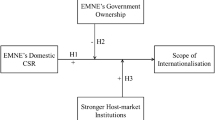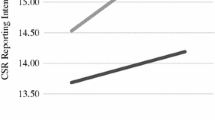Abstract
While a substantial amount of the literature describes corporate benefits of corporate social responsibility (CSR) initiatives, the literature is silent concerning why some companies announce CSR initiatives, yet fail to implement them. The article examines company delistings from the UN Global Compact. Delistings are surprising because the CSR agenda is seen as having won the battle of ideas. The analysis proceeds in two parts. I first analyze firm-level characteristics focusing on geography while controlling for sector and size; I find that geography is a significant factor while small firms are more likely to be delisted than large firms and some sector characteristics determine delistings. Next, I proceed to uncover country-level characteristics including the degree of international economic interdependence as well as the quality of governance institutions. Multivariate regression analysis shows that companies are less likely to be delisted from countries where domestic governance institutions are well-functioning. To a lesser extent, I find that firms from countries with international economies are more willing to comply with the UN Global Compact requirements. Countries with a high share of outward FDI/capita have a lower share of delisted firms as do countries that are internationally competitive.
Similar content being viewed by others
References
Acemoglu, D., S. Johnson and J. Robinson: 2001, ‘The Colonial Origins of Comparative Development’, American Economic Review 91(5), 1369-1401.
Aguilera, R.V. and G. Jackson: 2003, ‘The Cross-National Diversity of Corporate Governance: Dimensions and Determinants’, Academy of Management Review, 28(3), 447-465.
Aguilera, R.V., D.E. Rupp, C.A. Williams and J. Ganapathi: 2007, ‘Putting the ‘S’ Back in Corporate Social Responsibility: A Multilevel Theory of Social Change in Organization’, Academy of Management Review, 32(3), 836-863.
Baker, M.: 2010, ‘Blame the Big Names’, Ethical Corporation, 19 November.
Baron, D.P.: 1995, ‘Integrated Strategy: Market and Nonmarket Components’, California Management Review, 37 (winter), 47–65
Bennie, L., P. Bernhagen and N.J. Mitchell: 2007, ‘The Logic of Transnational Action: The Good Corporation and the Global Compact’, Political Studies 55(4), 733-753.
Berger, S.: 2000, ‘Globalization and Politics’, Annual Review of Political Science 3, 43-62.
Bertelsmann Stiftung: 2007, ‘CSR Navigator – Public Policies in Africa, the Americas, Asia and Europe’, http://www.bertelsmann-stiftung.de. Accessed 10 Feb 2011.
Bondy, K., D. Matten and J. Moon: 2004, ‘The Adoption of Voluntary Codes of Conduct in MNCs: A three country comparative study’ Business and Society Review 109(4), 449-477.
Bondy, K., D. Matten and J. Moon: 2008, ‘MNC Codes of Conduct: Governance Tools for CSR?’, Corporate Governance: An International Review 16(4), 294-311.
Brammer, S.J., S. Pavelin and L.P. Porter: 2006, ‘Corporate Social Performance and Geographical Diversification’, Journal of Business Research 59(9), 1025-1034.
Brown, D. and J. S. Knudsen: 2011, The Emerging Spread of CSR Initiatives in Multinational Firms – Do National Institutions and Government Policies Matter? Paper to be Presented at the 2011 SASE Conference in Madrid, Spain.
Brown, D., A. Roemer-Mahler and A. Vetterlein: 2010, ‘Theorising Transnational Corporations as Social Actors: An Analysis of Corporate Motivations’, Business & Politics 12(1), 1-39.
Campbell, J.: 2007, ‘Why Would Corporations Behave in Socially Responsible Ways? An Institutional Theory of Corporate Social Responsibility’, Academy of Management Review 32(3), 946-967.
Cantó-Milà, N. and J.M. Lozano: 2009, ‘The Spanish Discourse on Corporate Social Responsibility’, Journal of Business Ethics 87, 157-171.
Casper, S.: 2007, ‘Creating Silicon Valley in Europe: Public Policies towards New Technology Industries’, (Oxford University Press, Oxford, UK).
Crouch, C.: 2006, ‘Modeling the Firm in its Market and Organizational Environment: Methodologies for Studying Corporate Social Responsibility’, Organization Studies 27(10), 1533-1551.
Devinney, T.: 2009, ‘Is the Socially Responsible Corporation a Myth? The Good, the Bad and the Ugly of Corporate Social Responsibility’, Academy of Management Perspectives 23(2), 44-56.
Donaldson, T. and L. Preston: 1995, ‘The Stakeholder Theory of the Corporation: Concepts, Evidence, Implications’, Academy of Management Review 20, 65–91.
Environmental Finance: 2007, ‘UN Global Compacts Ejects a Further 203 Companies’, http://www.abdip.net/projects/undp/ph12/view. Accessed 8 June 2010.
Ethical Corporation: 2006, ‘Interview with Georg Kell, Global Compact Puts 335 Companies in Deep Freezer Until they Communicate on Progress’, 24 October, www.unglobalcompact.org/.../georg_kell_interview_ethical_corporation_2006.html. Accessed 30 April 2011
Feketekuty, G.: 1988, International Trade in Services. An Overview and Blueprint for Negotiations. American Enterprise Institute series on trade in services (Ballinger Publishing Company, Cambridge, MA).
Gjølberg, M.: 2009a, ‘Measuring the Immeasurable? Constructing an Index of CSR Practices and CSR Performance in 20 Countries’, Scandinavian Journal of Management 25, 10-22.
Gjølberg, M.: 2009b, ‘The Origin of Corporate Social Responsibility: Global Forces or National Legacies?, Socio-Economic Review 7, 605-637.
Global Policy Forum: 2004, ‘Global Counter Summit, Panel 1: Greenwash, Blue-Wash and the Corporate Takeover of the UN’, 23 June, www.globalpolicy.org/component/cintent/article/225/32250.html. Accessed 9 Jan 2010.
Gourevitch, P.: 1986, Politics in Hard Times: Comparative Responses to International Economic Crises, (Cornell University Press, Ithaca, NY).
Hall, P.A. and D. Soskice: 2001, Varieties of Capitalism. The Institutional Foundations of Comparative Advantage (Oxford University Press, Oxford, UK).
Jackson, G. and A. Apostolakou: 2010, ‘Corporate Social Responsibility in Western Europe: An Institutional Mirror or Substitute?’, Journal of Business Ethics 94(3), 371-394.
Johnston, A. and C. van Wijnbergen: 2010, Private Involvement in Compulsory Education. Paper Presented at the 17th Conference of Europeanists, Montreal, 15–17 April.
Jørgensen, A. and J. S. Knudsen: 2006, ‘Sustainable Competitiveness in Global Value Chains. How do Small Danish Firms Behave?’, Corporate Governance. The International Journal of Business in Society 6(special issue), 449–462.
Kaufmann, D., A. Kraay and M. Mastruzzi: 2008, Governance Matters VII. Aggregate and Individual Governance Indicators 1996-2007. Policy Research Working Paper 4654 (The World Bank, Washington, DC).
Kaufmann, D., A. Kraay and M. Mastruzzi: 2007a, ‘Growth and Governance: A Reply’, Journal of Politics 69(2), 555-562.
Kaufmann, D., A. Kraay and M. Mastruzzi: 2007b, ‘Growth and Governance: A Rejoinder’, Journal of Politics, 69(2), 570-572.
Kinderman, D.: 2009, Why do Some Countries get CSR Sooner, and in Greater Quantity than Others? The Political Economy of Corporate Responsibility and the Rise of Market Liberalism across the OECD: 1977-2007, WZB – Discussion Paper, SP III 2009-3001 (Wissenschaftszentrum Berlin, Germany).
Knack, S. and P. Keefer: 1995, ‘Institutions and Economic Performance: Cross-Country Tests Using Alternative Measures’, Economics and Politics, 7(3), 207-227.
Knopf, J., W. Kahlenborn, T. Hajduk and D. Weiss: 2011, ‘Final Draft CSR Compendium: Public Policies in the European Union’, (Adelphi, Brussels).
Kostova, T. and S. Zaheer: 1999, ‘Organizational Legitimacy under Conditions of Complexity: The Case of the Multinational Enterprise’, Academy of Management Review 24 (1), 64-81.
Kurtz, M.J. and A. Shrank: 2007, ‘Growth and Governance: Models, Measures and Mechanisms’, The Journal of Politics 69(2), 538-554.
Locke, R. and M. Roomis: 2010, ‘The Promise & Perils of Private Voluntary Regulation: Labor Standards and Work Organizations in Two Mexican Factories’, Review of International Political Economy 17(1), 45-74.
Lorenzo-Molo, M. C. F.: 2009, ‘Why Corporate Social Responsibility (CSR) Remains a Myth: The Case of the Philippines’, Asia Business & Management 8(2), 149-168.
Maignan, I. and D.A. Ralston: 2002, ‘Corporate Social Responsibility in Europe and the U.S: Insights from Businesses’ Self-Presentations’, Journal of International Business Studies 33(3), 457-514.
Margolis, J.D. and J.P. Walsh: 2001, People and Profits? The Search for a Link between a Company’s Social and Financial Performance, (Lawrence Erlbaum Associates, Princeton, NJ).
Matten, D. and J. Moon: 2008, ‘“Implicit” and “Explicit” CSR: A Conceptual Framework for a Comparative Understanding of Corporate Social Responsibility’, Academy of Management Review 33(2), 404-424.
Mosher, J.: 2010, Education State, Welfare State Regimes, Technological Change, and Politics. Paper Presented at the 17th Conference of Europeanists, Montreal, Canada, 15–17 April.
Neter, J., M. Kutner, C., Nachtsheim and W. Wassermann: 2004, Applied Linear Regression Models 4th edition, (McGraw-Hill Irwin, New York, NY).
Newsbreak, http://www.newsbreak.com.ph/csr/survey_bigcorps.html. Accessed 10 June 2010.
North, D.: 1990, Institutions, Institutional Change and Economic Performance (Cambridge University Press, Cambridge, UK).
Pauly, L.W. and S. Reich: 1997, ‘National Structures and Multinational Corporate Behaviour: Enduring Differences in the Age of Globalization’, International Organization 51(2), 1-30.
Porter, M. and M. Kramer: 2011, ‘Creating Shared Value. How to Reinvent Capitalism – and Unleash a Wave of Innovation and Growth’, Harvard Business Review, January–February, 63–77.
Porter, M. and M. Kramer: 2002, ‘The Competitive Advantage of Corporate Philanthropy’, Harvard Business Review 80(12), 56-68.
Porter, M. and M. Kramer: 2006, ‘Strategy and Society. The Link between Competitive Advantage and Corporate Social Responsibility’, Harvard Business Review 84(12), 78-92.
Potoski, M. and A. Prakash: 2005, ‘Green Clubs and Voluntary Governance: ISO 14001 and Firms’ Voluntary Compliance’, American Journal of Political Science 49(2), 235-248.
Rogowski, R.: 1990, Commerce and Coalitions: How Trade Affects Domestic Political Alignments (Princeton University Press, Princeton, NJ).
Ruggie, J.G.: 2004, ‘The Global Compact: An extraordinary Journey’, in C. Fussler, A. Kramer and S.V.d. Vegt (eds.), Raising the Bar: Creating Value with the UN Global Compact (Greenleaf Publishing, Sheffield, UK), pp. 15-17.
Sharfman, M.P., T.M. Shaft and L. Tihanyi: 2004, ‘Global and Institutional Antecedents of High-Level Corporate Environmental Performance’, Business in Society 43(1), 6-36.
Spar, D. and L. LaMure: 2003, ‘The Power of Activism: Assessing the Impact of NGOs on Global Business’, California Management Review 45(3), 78-110.
Steurer, R.: 2010, ‘The Role of Governments in Corporate Social Responsibility: Characterising Public Policies on CSR in Europe’, Policy Sciences 43(1), 49-72.
Stiglitz, J.: 2002, Globalization and its Discontents (Norton, New York, NY).
Talisayon, S. D.: 2009, Corporate Social Responsibility and Emergent Models in Management of Stakeholder Capital in Philippine Conglomerates. Paper presented at the Fifth International Research Workshop on Asian Business (Singapore Management University, Singapore), 13 April.
The Economist: 2005, ‘Survey: The Good Company’, http://www.economist.com/surveys/displaystory.cfm?story_id=E1_PVVVNTN. 22 January.
Thérien, J. and V. Pouliot: 2006, ‘The Global Compact: Shifting the Politics of International Development’, Global Governance 12, 55-75.
Transparency International’s 2010 Corruptions Perceptions Index, http://www.transparency.org/policy_research/surveys_indices/cpi/2010. Accessed 5 Dec 2010.
UN Global Compact: 2008, ‘News and Events, News Archives 2008’, www.unglobalcompact.org/newsandevents/news_archives/2008_06_25.html. Accessed 16 Nov 2009.
UN Global Compact: 2009a, ‘UN Global Compact Brochure’, www.unglobalcompact.org/abouttheGC. Accessed 16 Nov 2009.
UN Global Compact: 2009b, ‘UNGC Bulletin, 2009’, www.unglobalcompact.org/newsandevents/UNGC_bulletin/2009_11_01.html. Accessed 31 Dec 2009.
UN Statistics: ‘Trade Data’, http://unstats.un.org/unsd/trade/default.htm. Accessed 2 Dec 2010.
UNCTAD Foreign Direct Investment Database, http://www.unctad.org/Templates/Page.asp?intItemID=4979. Accessed 20 Nov 2010.
Vogel, D. J.: 2005, ‘Is There a Market for Virtue? The Business Case for Corporate Social Responsibility’, California Management Review 47(4), 19-45.
Vogel, D. J.: 2008, ‘Private Global Business Regulation’, Annual Review of Political Science 11, 261-282.
Waddock, S., C. Bodwell and S. Graves: 2002, ‘Responsibility: The New Business Imperative’, Academy of Management Executive 16(2), 132-148.
World Development Indicators, http://data.worldbank.org/data-catalog/world-development-indicators. Acc- essed 8 Nov 2010.
World Economic Forum: 2009, ‘Global Competitiveness Report 2009-2010’, http://www.weforum.org/issues/global-competitiveness. Accessed 9 Nov 2010.
Acknowledgments
I especially wish to thank Thomas Poulsen for his insights on statistics. I thank Dana Brown, Francesco Duina, Aleksandra Gregoric, Wenche Gwozdz, Klaus Meyer and Torben Pedersen for their comments on earlier versions of this work and the two anonymous reviewers who provided excellent input. I received helpful insights from participants in seminars at the Copenhagen Business School hosted respectively by the Center for Corporate Governance and the Center for Corporate Social Responsibility. I also presented earlier versions at the 2010 1st Nordic Conference on CSR at the Copenhagen Business School and at the 2010 EURAM Conference in Rome where participants offered useful ideas. Søren Mandrup from the UN Global Compact Office and Felipe Alfonso from the Asian Institute of Management in the Philippines also shared their knowledge with me. Henrik Rasmussen provided first-rate research assistance. I wish to thank the Center for Corporate Governance at CBS and the CBS World Class Program for financial support as well as Deloitte, Copenhagen for access to data. The usual disclaimers apply.
Author information
Authors and Affiliations
Corresponding author
Rights and permissions
About this article
Cite this article
Knudsen, J.S. Company Delistings from the UN Global Compact: Limited Business Demand or Domestic Governance Failure?. J Bus Ethics 103, 331–349 (2011). https://doi.org/10.1007/s10551-011-0875-0
Published:
Issue Date:
DOI: https://doi.org/10.1007/s10551-011-0875-0




